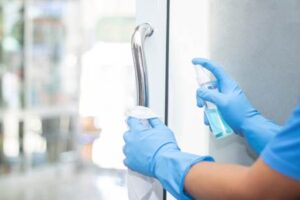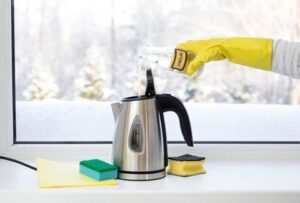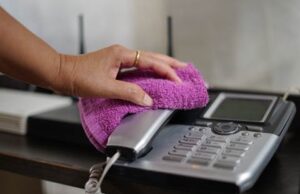– Office door handles have 30 times more bacteria than a toilet seat
– Flu season is officially underway as winter virus levels continue to rise
The 10 most harmful office hotspots that could be making people sick have been revealed, including sinks and microwaves.
As Chief medical officer professor Chris Whitty warns this year’s flu season to officially be underway, office hygiene has never been more important to prevent unwanted illnesses.
A study, conducted by office furniture suppliers, Furniture At Work, revealed the dirtiest areas of the office are the door handles, which harbour 30 times more bacteria than a toilet seat.
The office sink and the microwave door are also top breeding grounds for bacteria, while tests on a mobile phone in the office revealed it was over 15 times dirtier than an office toilet.
Here are the dirtiest areas of the office to be aware of this winter season:
1. Door handles (30x more bacteria than a toilet seat)
Door handles are one of the most neglected areas, as well as one of the most used by different people multiple times a day. To be on the safe side at work, try and remember to sanitise or wash your hands after using a door handle.
2. Office sink (23x more bacteria than a toilet seat)
The office sink can be a haven for bacteria if it’s not properly sanitised throughout the day. A regular cleaning routine is recommended for the office sink. Employers can encourage this by putting up signs and supplying ample cleaning supplies.
3. Microwave door (19x more bacteria than a toilet seat)
The microwave door is similar to office door handles; it’s regularly used throughout the day but often neglected when it comes to cleaning. Health professionals recommend deep cleaning the microwave once a week to prevent a dangerous build-up of dirt and bacteria.
4. Mobile phone (16x more bacteria than a toilet seat)
Every time you put your phone down it could be picking up potentially dangerous bacteria, making it important to give it a regular cleanThe most effective way to do this is by gently running an alcohol wipe over your device at least once a day.
5. Kettle (13x more bacteria than a toilet seat)
Like other kitchen appliances, the kettle needs regular cleaning to ensure it’s in a great condition for employees to use throughout the day, as well as removing the build-up of limescale in the base of the kettle.
6. Toilet tap (11x more bacteria than a toilet seat)
The taps and any bathroom surface that an employee’s hands may come into contact with, like soap dispensers and hand dryers, should be cleaned regularly to stop the spread of bacteria.
7. Office chair (10x more bacteria than a toilet seat)
Regular cleaning can freshen up your chair and remove any dust and germs. Most office chairs are safe for water-based cleaning, and using rubbing alcohol can be a great way to remove stains.
8. Kitchen fridge (9x more bacteria than a toilet seat)
When it comes to office hygiene, the place where workers store all their food should be top of the list. The office fridge should have a routine clean every week, where old food products are removed, and it’s given a wipe down.
9. Desk phone (9x more bacteria than a toilet seat)
The phone is one of the most used pieces of equipment in the office, making it important to clean it regularly to stop the spread of germs by using a damp microfibre cloth.
10. Keyboard (8x more bacteria than a toilet seat)
Any bacteria or germs picked up around the office will more than likely end up on your keyboard. The keyboard is a hotspot for bacteria, dirt and food, and needs cleaning regularly for health and safety with a damp microfibre cloth.
For a more detailed breakdown of the study and additional office cleaning tips, visit the Furniture At Work blog.
Help keep news FREE for our readers
Supporting your local community newspaper/online news outlet is crucial now more than ever. If you believe in independent journalism, then consider making a valuable contribution by making a one-time or monthly donation. We operate in rural areas where providing unbiased news can be challenging. Read More About Supporting The West Wales Chronicle

























